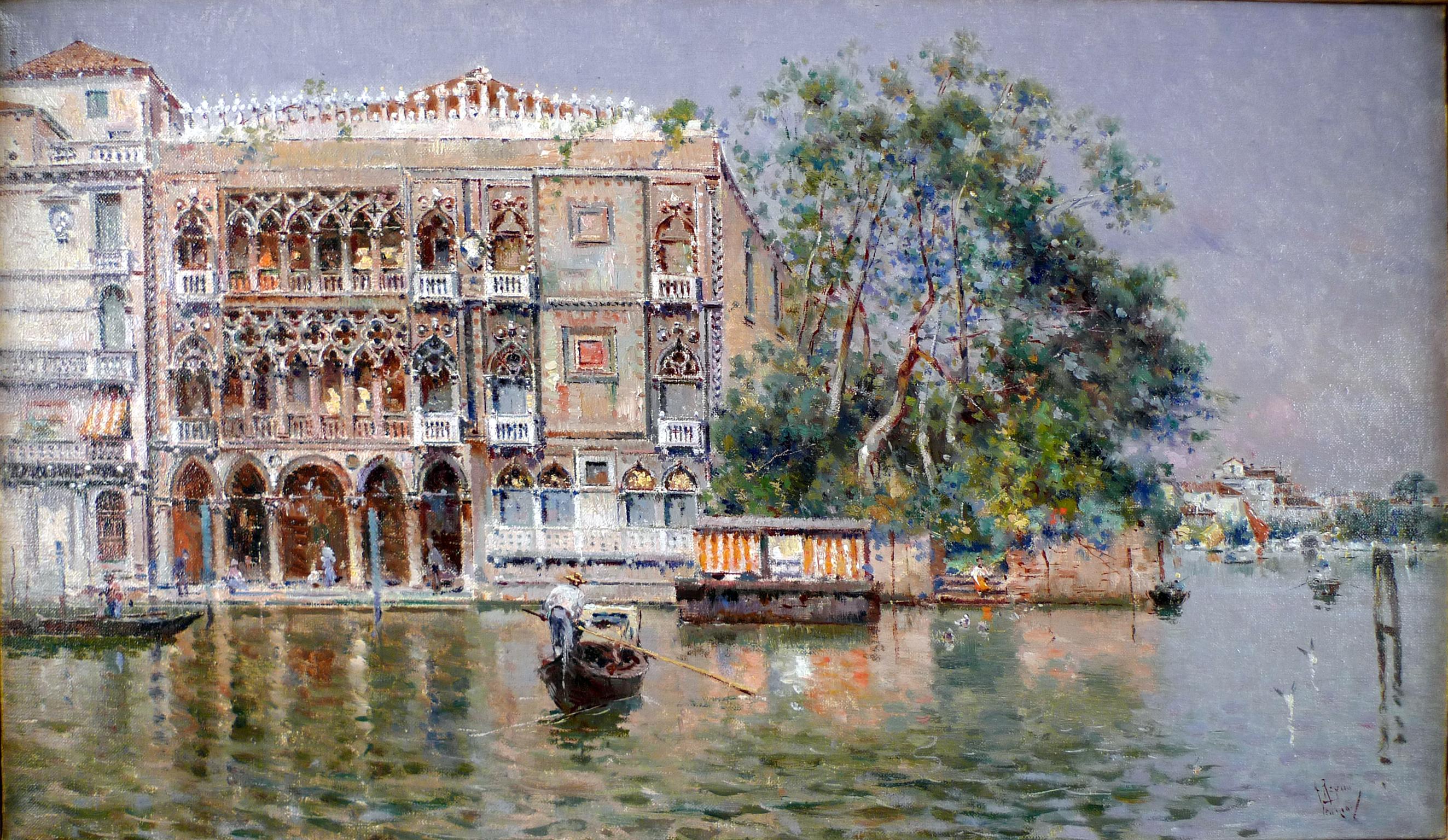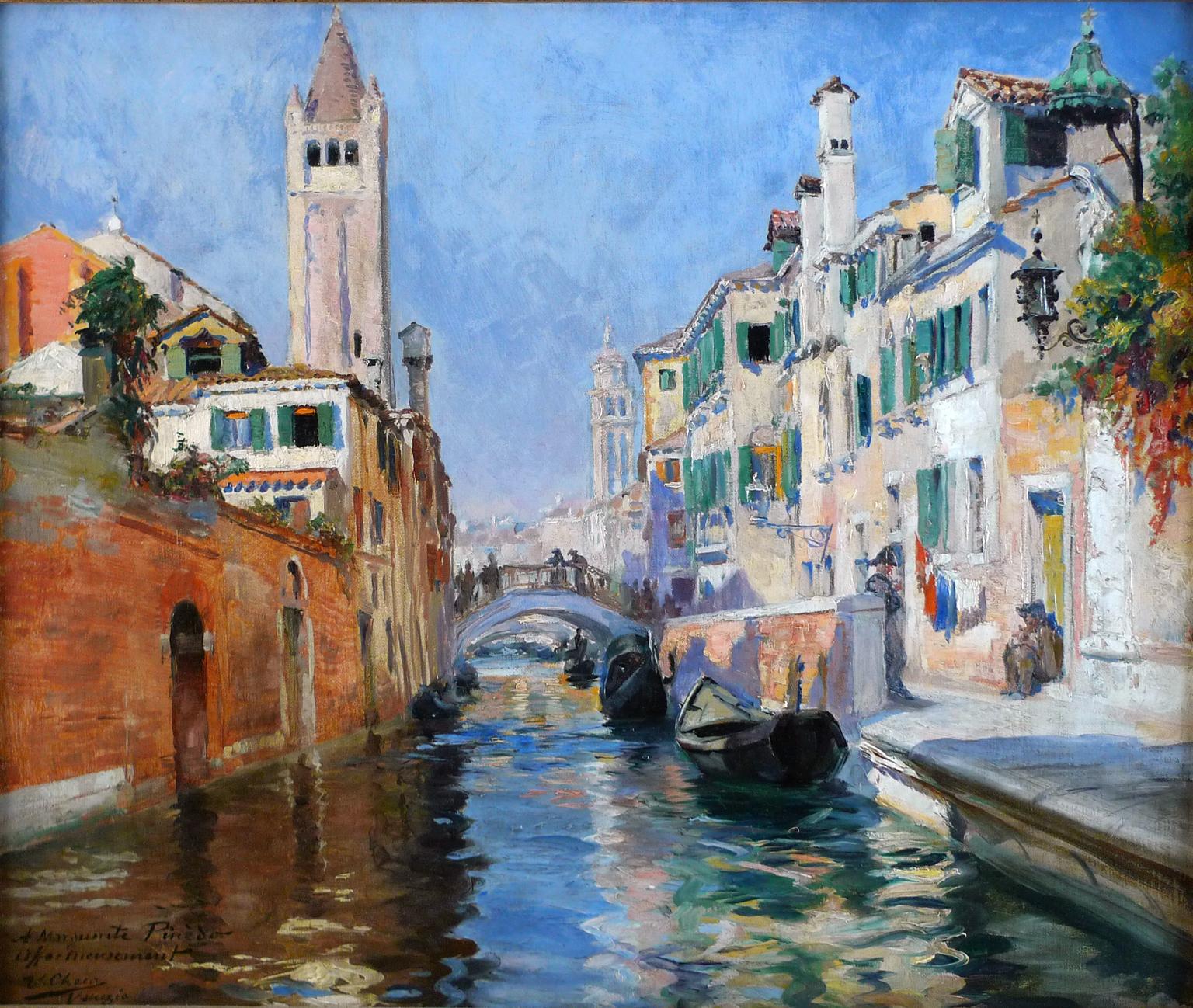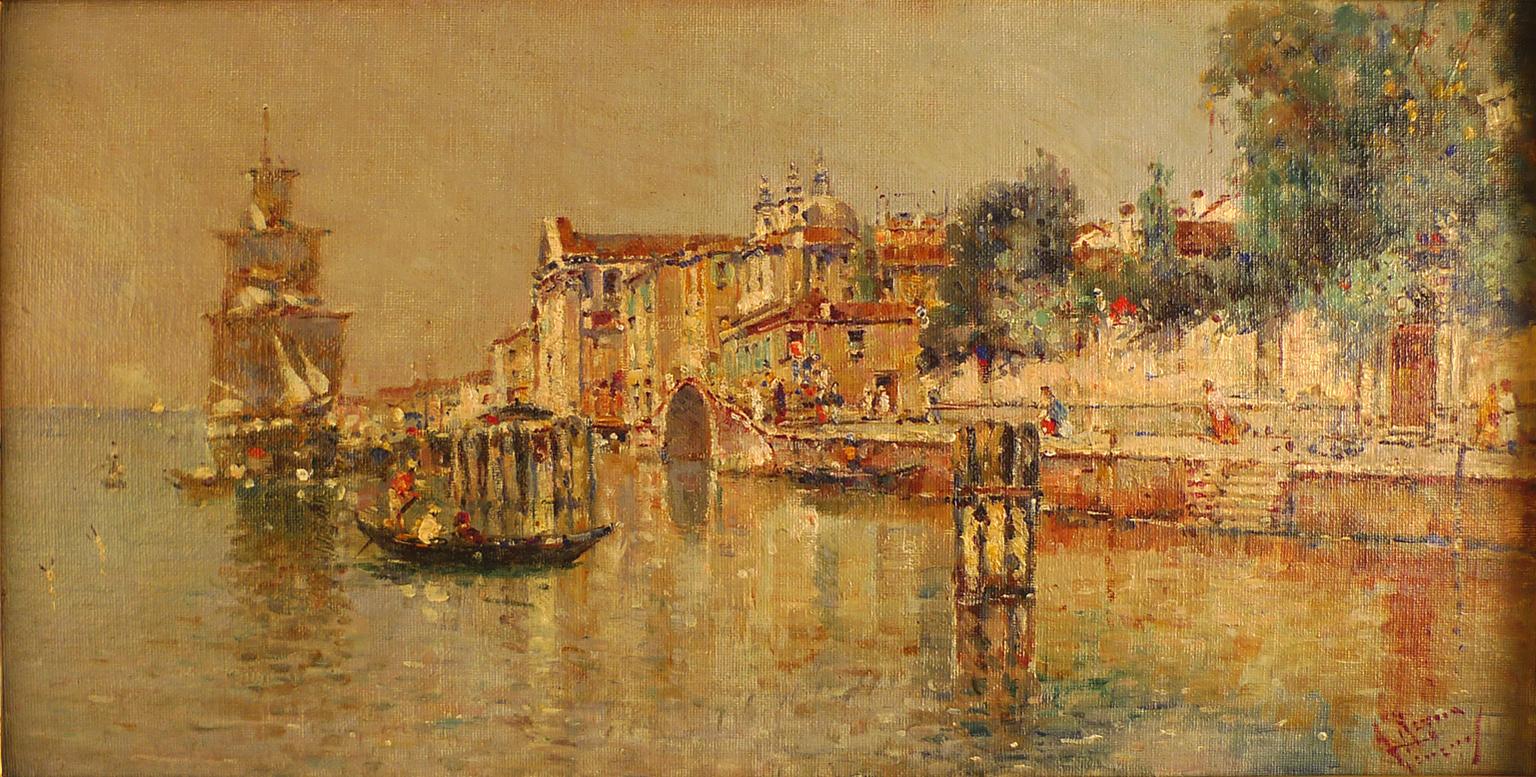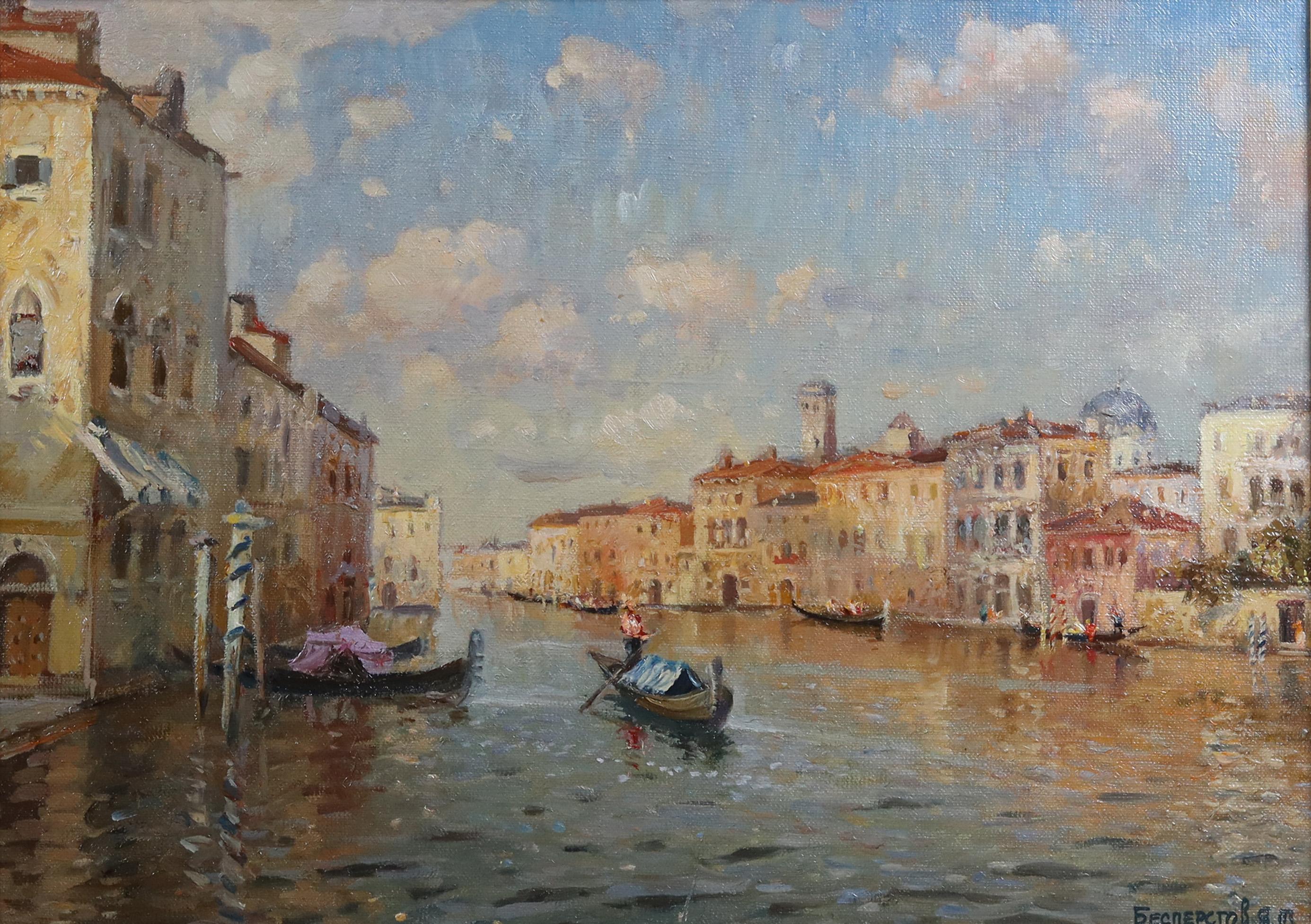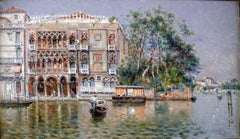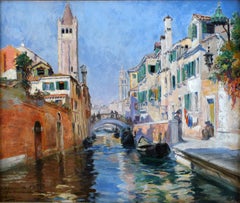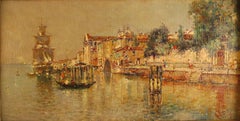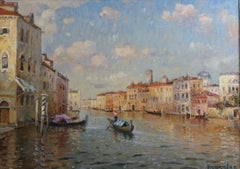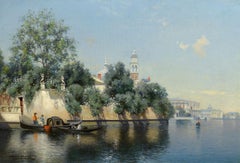Items Similar to "Venetian Canal" Late 19th Century Oil on Canvas by Spanish Artist Antonio Reyna
Want more images or videos?
Request additional images or videos from the seller
1 of 14
Antonio Reyna Manescau"Venetian Canal" Late 19th Century Oil on Canvas by Spanish Artist Antonio ReynaCirca 1900
Circa 1900
$29,998.34
£22,122.61
€25,000
CA$41,427.44
A$45,455.77
CHF 23,789.43
MX$559,406.52
NOK 299,711.18
SEK 280,724.18
DKK 190,405.71
About the Item
ANTONIO REYNA MANESCAU
Spanish, 1859 - 1937
VENETIAN CANAL
signed & located "A. Reyna, Venezia" (lower left)
oil on canvas
11-1/2 x 19-3/4 inches (29 X 50cm.)
framed: 17-1/4 X 25-1/4 inches (43.5 X 64 cm.)
PROVENANCE
Private Collector, Madrid
Reyna was considered the most notable representative of Venetian vedutism of the 19th century. He traveled to Venice in 1855 and was totally impressed by the beauty of the place, and from that moment on, Venice will be the inexhaustible framework of his work.
It is this beautiful Venetian view we observe its bold light brushstroke, a skillful composition that makes us enjoy the perspective of one of the Venetian canals with its palaces on the sides of its channel and a small bridge in the distance. The small gondolas at rest on the calm waters of the canal gives us a pleasant sensation of tranquility.
Its chromatic richness and the ease of its brushstroke complete the beauty of this work.
Antonio Reyna Manescau (5 December 1859 - 3 February 1937), was a Spanish painter that developed most of his career in Italy. A member of the Málaga School of Painting, he studied under Bernardo Ferrándiz and alongside Moreno Carbonero. He moved to Italy in his early 20's, where he was further influenced by Italian and Spanish expatriate artists, and where he lived for the rest of his life.
After his first visit to Venice in 1885, he specialized in landscape painting. He is widely known for the preciosity of his Venetian vedutas, the importance he places in the accurate depiction of architectural detail and his mastery of color. Among his most important works are his numerous views of the Venetian canals and Piazza San Marco.
Born in the town of Coín (Málaga), he was one of ten children (six of which died in childhood) of Francisco Reyna Zayas (1825-1892) and Matilde Manescau y Otsman (1823-1910). His parents enjoyed a good social standing, being his uncle José Reyna Zayas mayor of Coín while Antonio was a child
Being still a little boy Antonio showed a great ability for drawing. Although he continued living in Coín for the rest of his childhood, he began his artistic training at the School of Fine Arts in Malaga, where he was taught by Joaquín Martínez de la Vega, first, and then by Bernardo Ferrándiz, founder of the Málaga School of Painting. He studied alongside future master José Moreno Carbonero, who was just a year older than him. From a young age he exhibited his works regularly, standing out in the local artistic environment for his use of colors, the attractiveness of his compositions and the agility of his brushwork. In 1880, at age 20, he sold his first important work for the town hall of Coín.
In 1882 he received a scholarship from the Provincial Council to further his art studies in Italy. He moved to Rome (where he was to live until his death), and in 1885 visited Venice; from that year on, Venetian landscapes, showing landmarks like the Grand Canal and Piazza San Marco but also less known quarters of the city, are ubiquitous in his work. Venice was at that time an artistic hub for Spanish painters, thanks in part to Fortuny's widow residing there, and also because of the Venetian production of Villegas Cordero and Martín Rico, whose preciosity in the depiction of the landscape was adopted by Reyna Manescau.
Although his scholarship was supposed to finish in 1886, he was captivated by Italy and remained there. In Rome he frequently visited the workshop of Villegas Cordero, like so many other Spaniards, and under his influence he produced some oriental paintings. At the same time, as a member of the Spanish colony, he was a regular in tertulias in the Café El Greco. In 1889 he married the opera singer Beatriz Mililotti Desantis, then 20, and settled to live in Rome.
Canal in Venice. Museum of Fine Arts, Boston.
Influenced by classical antiquity, by the mid 1880s he painted his lost masterwork Floralia, a classical scene that represents the annual festival celebrated in honor of the mythical goddess
Reyna Manescau's works are represented at museums such as the Boston Museum of Fine Arts, the Hermitage Museum, the Carmen Thyssen Museum and the Málaga Museum, and are also present in various private collections.
- Creator:Antonio Reyna Manescau (1859 - 1937)
- Creation Year:Circa 1900
- Dimensions:Height: 11.42 in (29 cm)Width: 19.69 in (50 cm)
- Medium:
- Movement & Style:
- Period:
- Condition:
- Gallery Location:Madrid, ES
- Reference Number:1stDibs: LU128115176552
About the Seller
5.0
Vetted Professional Seller
Every seller passes strict standards for authenticity and reliability
Established in 1977
1stDibs seller since 2019
21 sales on 1stDibs
Typical response time: 2 hours
- ShippingRetrieving quote...Shipping from: Madrid, Spain
- Return Policy
Authenticity Guarantee
In the unlikely event there’s an issue with an item’s authenticity, contact us within 1 year for a full refund. DetailsMoney-Back Guarantee
If your item is not as described, is damaged in transit, or does not arrive, contact us within 7 days for a full refund. Details24-Hour Cancellation
You have a 24-hour grace period in which to reconsider your purchase, with no questions asked.Vetted Professional Sellers
Our world-class sellers must adhere to strict standards for service and quality, maintaining the integrity of our listings.Price-Match Guarantee
If you find that a seller listed the same item for a lower price elsewhere, we’ll match it.Trusted Global Delivery
Our best-in-class carrier network provides specialized shipping options worldwide, including custom delivery.More From This Seller
View All"Ca' d' Oro, Venice" Late 19th Century Oil on Canvas of Venice, by Antonio Reyna
By Antonio Reyna Manescau
Located in Madrid, ES
ANTONIO REYNA MANESCAU
Spanish, 1859 - 1937
CA' D' ORO, VENICE
signed & located "A. Reyna, Venezia" (lower right)
oil on canvas
11-1/2 x 19-3/4 ...
Category
1890s Realist Landscape Paintings
Materials
Canvas, Oil
"Venice Canal", 19th Century Oil on Canvas by Spanish Painter Ulpiano Checa
Located in Madrid, ES
ULPIANO CHECA
Spanish, 1860 - 1916
VENICE CANAL
signed & located "U. Checa" Venezia (lower left)
Also dedicated: "A Marguerite Pinédo affectueusement"
...
Category
1890s Impressionist Landscape Paintings
Materials
Canvas, Oil
"Venetian scene", 19th Century oil on canvas laid on cardboard by Antonio Reyna
By Antonio Reyna Manescau
Located in Madrid, ES
ANTONIO REYNA MANESCAU
Spanish, 1859 - 1937
VENETIAN SCENE
signed & located "A. Reyna, Venezia" (lower right)
oil on canvas laid on cardboard
8 ...
Category
Early 1900s Realist Landscape Paintings
Materials
Canvas, Oil, Cardboard
Large "View of Venice", 19th Century Oil on Canvas by Karl Kaufmann
By Karl Kaufmann
Located in Madrid, ES
KARL KAUFMANN
Austrian, 1843 - 1901
VIEW OF VENICE
signed & dated "K. Kaufmann 1894" (lower right)
oil on canvas
38-3/4 x 56-1/8 inches (98 x 142 cm.)
framed: 41-1/2 x 59-1/4 inches ...
Category
1890s Naturalistic Figurative Paintings
Materials
Canvas, Oil
Large "View of The Doge's Palace Venice", 19th C. Oil on Canvas by Karl Kaufmann
By Karl Kaufmann
Located in Madrid, ES
KARL KAUFMANN
Austrian, 1843 - 1901
VIEW OF VENICE OF THE DOGE'S PALACE, VENICE
signed & dated "K. Kaufmann 1894" (lower right)
oil on canvas
38-3/4 x 56-1/8 inches (98 x 142 cm.)
fr...
Category
1890s Naturalistic Figurative Paintings
Materials
Canvas, Oil
"Saint Marks Square", 19th Century oil on canvas of Venice by Antonio Reyna
By Antonio Reyna Manescau
Located in Madrid, ES
ANTONIO REYNA MANESCAU
Spanish, 1859 - 1937
SAINT MARKS SQUARE
signed & located "A. Reyna, Venezia" (lower right)
oil on canvas
15-1/2 x 21-3/8 ...
Category
Early 1900s Realist Landscape Paintings
Materials
Canvas, Oil
You May Also Like
A Venetian Canal Scene
Located in West Sussex, GB
Yakov Besperstov
(1929-1989)
A Venetian Canal Scene
Oil on canvas: 13 x 18in. Frame: 18 x 23 in. Circa 1970’s
Yakov Tarasovich Besperstov was a So...
Category
20th Century Impressionist Landscape Paintings
Materials
Oil, Acrylic
Venice Grand Canal Landscape Bouvard Aldine 19/20th Century Paint Oil on canvas
Located in Riva del Garda, IT
Antoine Bouvard, called Marc Aldine (L'Isere 1875 - Paris 1957)
Signed 'Bouvard' lower right
View of Venice with the Grand Canal (link)
oil on canvas
60 x 86 cm
Framed 70 x 96 cm.
Very good condition
We present an evocative view of Venice with a glimpse of the fascinating Grand Canal, signed by the famous French Vedutist Antoine Bouvard, also known by his pseudonym, Marc Aldine.
Considered one of the most talented illustrators of the lagoon city who worked there in the first part of the 20th century, he became one of the most acclaimed vedutists of that period, with a success that led him to exhibit throughout France and Italy as well as in numerous European galleries...
Category
19th Century Expressionist Paintings
Materials
Oil
$7,238 Sale Price
20% Off
"Canal Pinelli, Venise" Paul Désiré Trouillebert, Venetian Scene in Italy
By Paul Desire Trouillebert
Located in New York, NY
Paul Désiré Trouillebert
Canal Pinelli, Venise
Signed lower left
Oil on canvas
18 3/4 x 12 3/8 inches
Provenance:
Artist's studio sale, 1887, no. 4
With M. Newmann London
Sale, Christie's, London, Save the Children Fund, May 16, 1961 (according to an inscription on the reverse)
Private Collection, United Kingdom
Literature:
Marumo et al, Paul Désiré Trouillebert: Catalogue Raisonné de l'œuvre peint, Stuttgart, 2004, cat. no. 0362 p. 336, illustrated.
Paul Désiré Trouillebert was born in Paris in 1829 and died in the city June 28, 1900. He is considered a portrait, genre and landscape painter from the French Barbizon School. He was a student of Ernest Hébert [1817-1908] and Charles-François Jalabert [1819-1901], and made his debut at the Salon of 1865, exhibiting a portrait. At the Paris Salon of 1869, Trouillebert exhibited “Au bois Rossignolet”, which was a lyrical Fontainebleau landscape that received great critical acclaim.
Trouillebert concentrated on portraits until about 1881, when he began to focus on atmospheric silvery landscapes steeping in cool damp color. In 1882, he exhibited a large landscape titled “Baignneuses” which was well received and helped him gain a reputation as a landscape painter. Another noted work was commissioned by Edmé Piot, a public works contractor. The painting, “Travaux de relèvement du chemin de fer de ceinture: le pont du Cours de Vincennes” (Cleveland Museum) was of a railway project initiated in 1851, after Napoleon III came to power. The commission included four related views of the Paris railway construction, which was completed in February 1889.
After the 1860’s, the misty Barbizon landscapes by Jean-Baptist- Camille Corot’s [1796-1875] had become astonishingly vogue, which brought about a trove of imitators. His followers and students; Henri Joseph Constant Dutilleux [1807-1865], George Devillers, Achille François Oudinot [1820-1901], Edouard Brandon [1831-1887] and Trouillebert were not trying to mislead the public, he was their idol. However, the greatest confusion has always been over works by Corot and Trouillebert because both artists painted river landscapes at dawn or dusk with a very similar approach, palette and style. Like Corot, Trouillebert painted a wide variety of subjects, including genre scenes, portraits and nudes.
Trouillebert would receive the most attention as a result of an 1883 court case involving one of his paintings. The painting “La Fontaine des Gabourets” had been sold by one of Paris’ more prominent dealers George Petit to writer Alexandre Dumas fils. Trouillebert’s signature and been removed and resigned Corot. The fake was discovered by Robaut and Bernheim-Jeune and returned to the original seller, Tedesco. Trouillebert, who had nothing to do with the fraud, brought legal action against the guilty parties to regain his reputation and clear his name. The trial made all of the papers and Trouillebert won his case. George Pettit...
Category
19th Century Landscape Paintings
Materials
Canvas, Oil
"Venice, 1906, " Italy, Warren W. Sheppard, Realist, Oil, Gondola, Canal
By Warren W. Sheppard
Located in Wiscasset, ME
Marine painter Warren W. Sheppard was born in Greenwich, New Jersey, to a ship captain father who instilled in his son a love and respect for the sea. He studied privately with Mauritz F. H. De Haas and took courses in drawing at Cooper Union in New York City. He traveled along the Mediterranean coast in 1879, sketching the ports of Naples, Gibraltar, Genoa and Messina. Sheppard’s foreign tours continued between 1888 and 1893, with stays in Paris and Venice, where he captured the architecture and busy canals of the Floating City. This fondness for travel also translated to his home country. He sailed along the East Coast from New Jersey to Maine in search of subjects and was an expert navigator, eventually writing the book Practical Navigation. Yacht design became a second career for Sheppard and he participated in a number of sailing competitions himself, most notably winning the New York-to-Bermuda race twice while skipper of the Tamerlane.
Sheppard exhibited at the Denver Exposition, Chicago Exposition...
Category
Early 1900s Realist Landscape Paintings
Materials
Canvas, Oil
Venetian Canal
Located in Wiscasett, ME
An oil on canvas signed in the lower left and presented in a gilded frame under glass. A wonderful scene of a sunny day on the canal in Venice, Italy. Measuring 20.25" x 24.25" inclu...
Category
Early 1900s Impressionist Landscape Paintings
Materials
Oil Pastel, Oil
Gondolas on a Venetian Canal - French Victorian art oil painting Venice Italy
Located in Hagley, England
This fabulous vibrant French Victorian Venetian landscape oil painting is by noted artist Germain Fabius Brest. It was painted circa 18...
Category
19th Century Realist Landscape Paintings
Materials
Oil
More Ways To Browse
Malaga Painting
Antique Spanish Oil Painting
19th Century Provincial Oil Painting
19th Century Spanish Paintings
Goddess Dior
Antonio Reyna Manescau
Jose Ferrandiz
Beach Dune Painting
Bodega Bay
Cattle Watering Oil Painting
Christopher Willett Art
Connecticut Landscape Painting
Giovanni Paolo Panini
Hampstead Heath
Horse Fountain
Horses In Meadow Oil Painting
Italian Landscape Painting 19th Century G
Louis Boulanger
